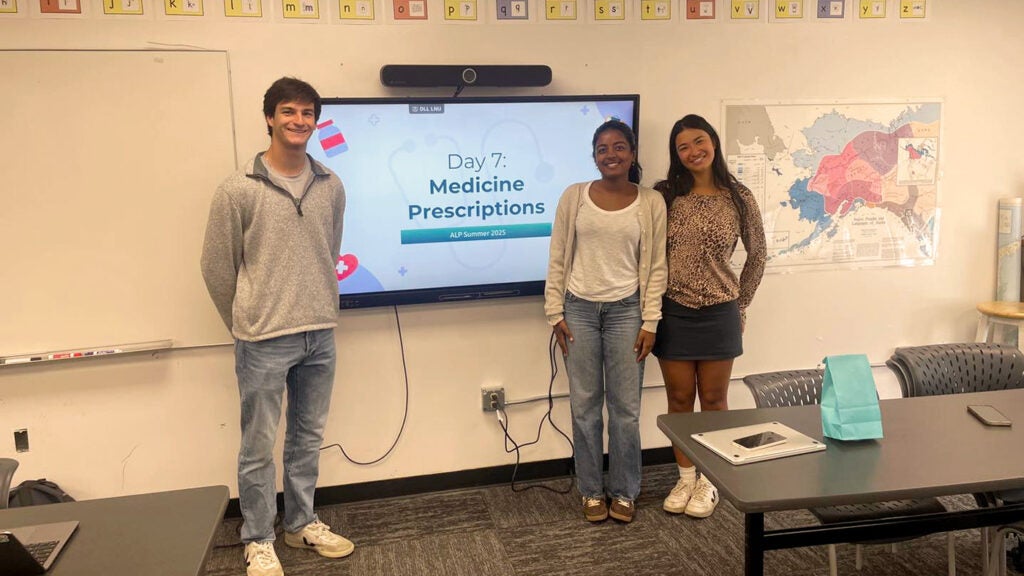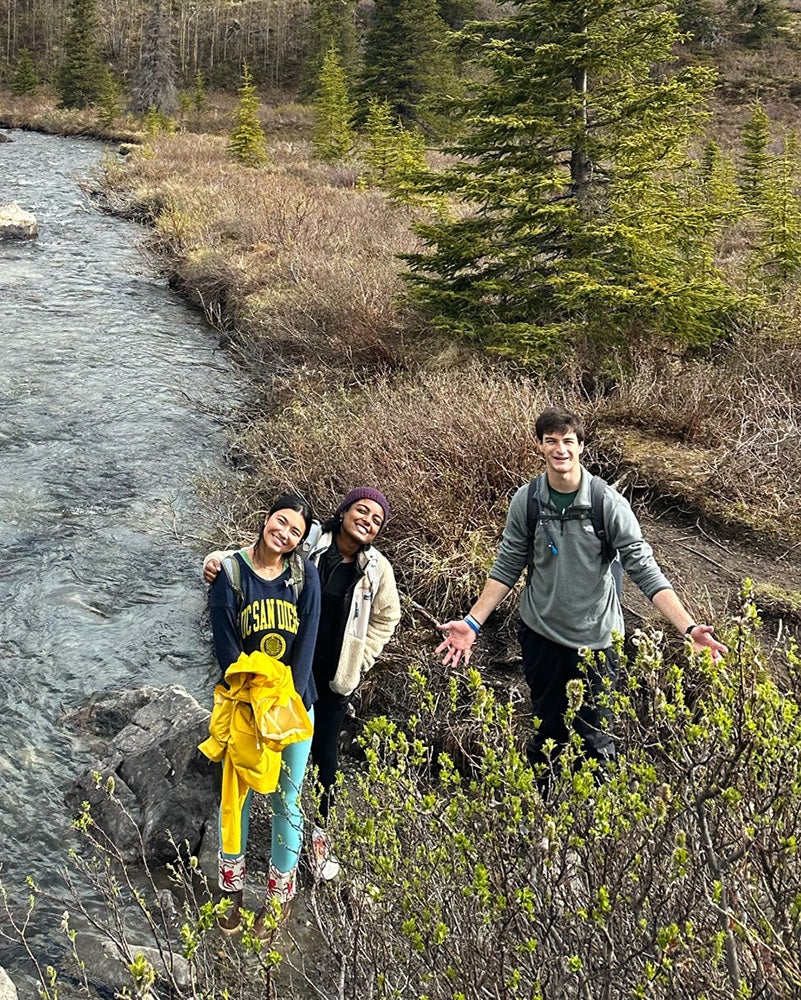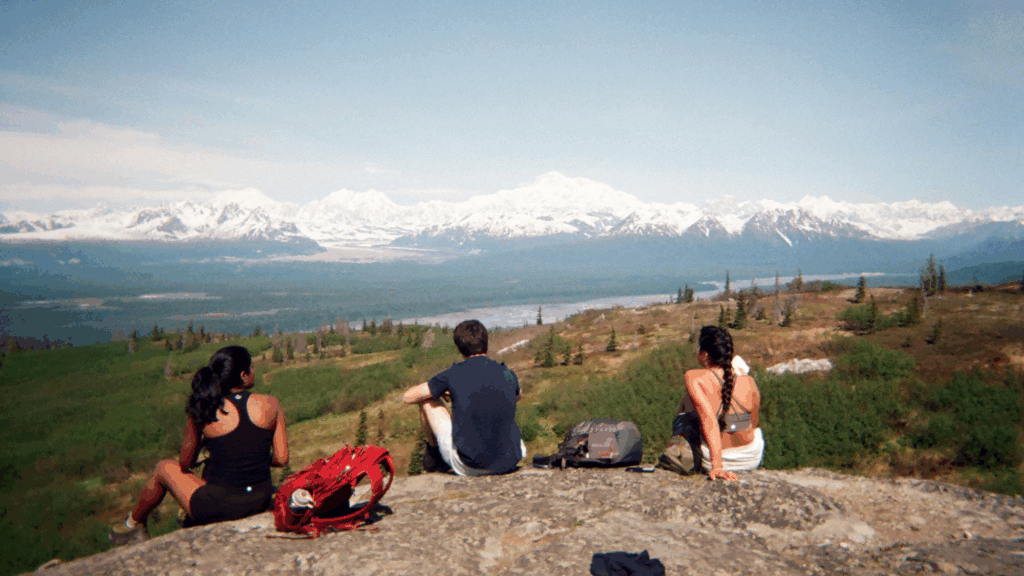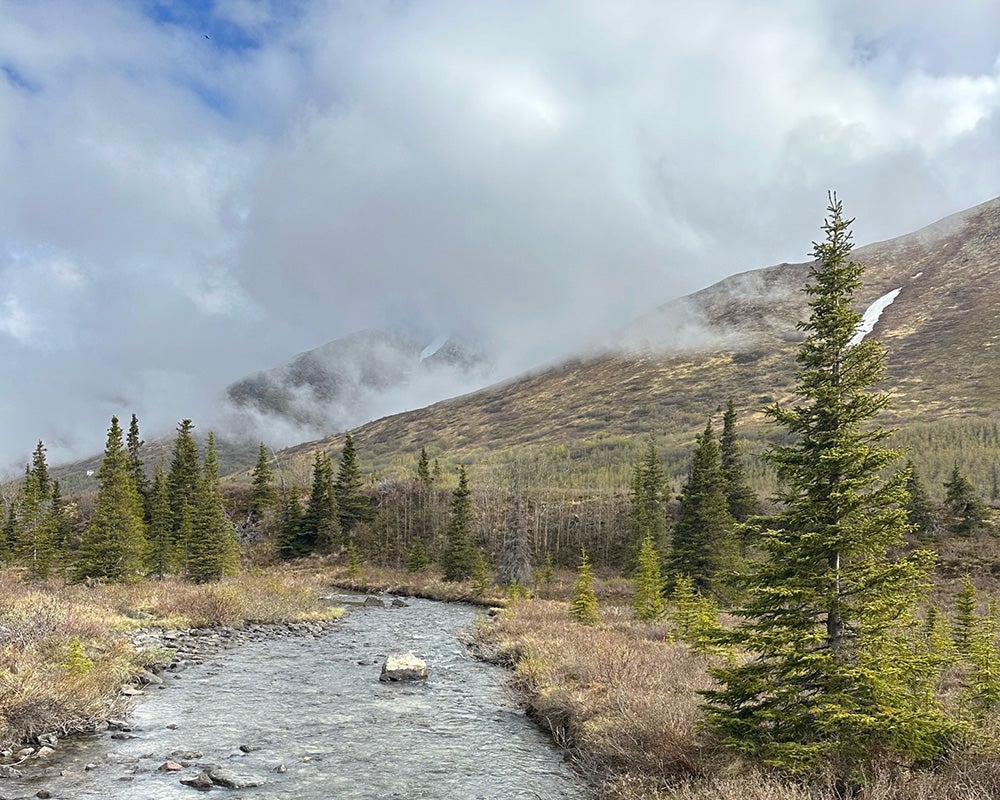School of Health Students Embrace Patient Advocacy While Teaching Health Literacy Courses in Alaska

(From l) Brennan Moore (H’27), Pranathi Jammula (H’27) and Delphine Armand (H’28) participated in this year’s Alaska Literacy Program.
(August 1, 2025) — Each summer, School of Health students volunteer to teach health literacy classes to immigrants in Anchorage, Alaska. Through a longstanding collaboration with the Alaska Literacy Program (ALP), established in 2018, students help English language learners better understand and navigate the complexities of the U.S. health care system. In turn, the experience offers students valuable insight into the challenges of translating complex medical information in ways that ensure patients fully understand their care.
“Anchorage is really a melting pot, with immigrants from all over the world coming to the city,” said Joan Riley, MS, MSN, FNP-BC, FAAN, associate professor of human science in the School of Health and the faculty director of the Alaska Literacy Program course at Georgetown. English language learners who migrated to Alaska from Argentina, China, Mexico, Senegal, Thailand and France have benefitted from the program.
“I’m a global health major and I’m interested in looking at public health domestically and globally, and teaching the ALP course allows you to see how understandings of health care operate with different demographics in a different cultural setting,” said Delphine Armand (H’28).
“The conversations in the class were so varied and powerful,” said Pranathi Jammula (H’27), a human science major. “Topics such as what is healthy food and what is standard dental care varied by their country and led me to think about what these variances mean for health.”
The students’ travel expenses to Alaska were covered in part by the School of Health’s Experiential Learning and Professional Development Fund.
Developing a Partnership
School of Health students are invited to take part in the Alaska Literacy Program while taking Riley’s Health Promotion and Disease Prevention course, usually in their sophomore year. Riley has had an academic interest in health literacy for decades.

School of Health students are invited to take part in the Alaska Literacy Program while taking School of Health associate professor Joan Riley’s Health Promotion and Disease Prevention course.
“My interest in health literacy grew out of my clinical practice as a family nurse practitioner, where I witnessed how a lack of understanding impacts care,” said Riley. “For example, I had one patient who I prescribed an oral liquid antibiotic to for an inner ear infection. The patient was giving the medicine in the ear because the child’s last infection was an outer ear infection that required drops.”
Conveying health care information can be difficult even if there’s a shared language between provider and patient. The collaboration between Georgetown and the ALP started in 2018 after an ambitious student in Riley’s class sent a cold email to ALP to see if they would be interested in having School of Health students teach health literacy classes.
The students receive training from ALP before departing for Alaska.
“ALP provided us with different learning modules about the best way to teach language literacy,” Armand said. “It allowed us to get our bearings and workshop lessons with each other where we would practice breaking up in small groups and going over scripts.”
According to Riley, most of the English language learners have some everyday understanding of English so the School of Health students are able to use vignettes and role-play to discuss health vocabulary.
In the Classroom
In their ALP course, School of Health students cover a range of topics, from health insurance to making doctors’ appointments. Armand and Jammula helped co-teach for the first five weeks, while another School of Health student, Brennan Moore (H’27), a human science major, taught for the full eight weeks. Twelve English language learners were enrolled in the course.
“Our School of Health students learn very quickly that relationships in the classroom and in health care have to be based on trust to be successful,” said Riley.
“We were only together with our students for a short amount of time, but we developed relationships together that were really empowering,” said Jammula.
“One of the most impactful lessons was discussing how to ask questions in a clinical setting and really advocate for yourself when seeing a doctor,” said Armand. “It’s so important to be able to ask questions in a health care setting, especially for people in a more vulnerable position like English language learners, in order to understand something like how to effectively take medications.”
The lesson on navigating the U.S. insurance system stood out for Moore. “We tried to cover as much as we could about the U.S. health care system over a two-day lesson, even getting down into the details about what a copay is,” said Moore.
While teaching his course, Moore received a text message from a student who was unable to make it to class because she was in the hospital with her boyfriend, who had been injured. “Her text expressed how appreciative she was for the ALP class, because it helped her navigate the hospital and meetings with doctors,” said Moore. “To experience that kind of real-world application for the course was amazing.”

The students experienced Alaska’s natural wonders in their free time.
Lasting Memories
The School of Health students found opportunities outside the classroom, such as volunteering with the Alaska Native Tribal Health Consortium assembling safer injection kits for HIV prevention and opioid overdose response.
“The work with the Alaska Native Tribal Health Consortium exposed me to a different side of public health, grounded in harm reduction and quiet, behind-the-scenes impact,” said Jammula.
Moore took advantage of being in Anchorage by embracing the opportunity to explore the region’s natural beauty.
“I’ve had the chance to go hiking and even saw a moose with babies, which was amazing,” said Moore. “I’m also hoping to camp out in Denali National Park before heading back to campus too.”
Teaching health literacy to immigrants in Anchorage was a deeply rewarding experience for the School of Health students that challenged them to think more deeply about health equity and culturally responsive communication. All of the students expressed an interest in a future in medicine and believe the experience with ALP will inform how they approach patient interactions in the future.
“Our time here has shown us how to connect with people without having a shared background or language, and the importance of taking the time to try and explain information so everyone is on the same page,” said Moore.
Heather Wilpone-Welborn
GUMC Communications

The students’ travel expenses to Alaska were covered in part by the School of Health’s Experiential Learning and Professional Development Fund. The fund enhances the school’s capacity to facilitate meaningful internships, experiential learning opportunities and professional development activities, all of which are designed to prepare students to be effective leaders in a dynamic and rapidly changing world.
A gift to this fund will help expand access to these opportunities by enabling the school to increase stipends for transportation, lodging and other related expenses; invest in additional personnel, including program coordinators and professional coaches; and support student participation in conferences and other off-campus educational activities.
